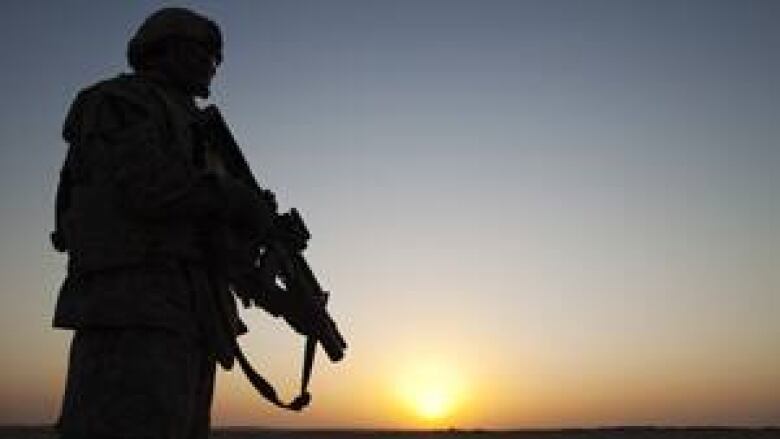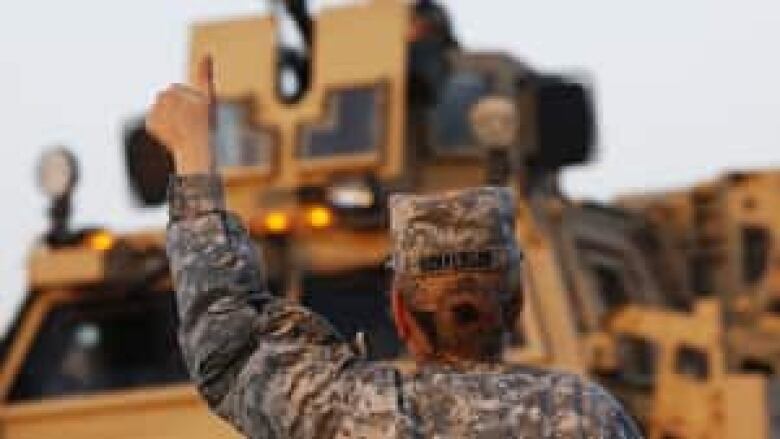Last U.S. troops leave Iraq

The last U.S. soldiers rolled out of Iraq across the border to neighbouring Kuwait at daybreak Sunday, whooping, fist bumping and hugging each other in a burst of joy and relief.
Their exit marked the end of a bitterly divisive war that raged for nearly nine years and left Iraq shattered, with troubling questions lingering over whether the Arab nation will remain a steadfast U.S. ally.
The mission cost nearly 4,500 American and well more than 100,000 Iraqi lives and $800 billion from the U.S. Treasury. The question of whether it was worth it all is yet unanswered.
Capt. Mark Askew,from Tampa, Fla., who was among the last soldiers to leave, said the answer to that question will depend on what type of country and government Iraq ends up with years from now, whether they are democratic, respect human rights and are considered an American ally.
"It depends on what Iraq does after we leave," he said, speaking ahead of the exit. "I don't expect them to turn into South Korea or Japan overnight."

The war that began in a blaze of aerial bombardment meant to shock and awe the dictator Saddam Hussein and his loyalists ended quietly and with minimal fanfare. U.S. officials acknowledged the cost in blood and dollars was high, but tried to paint a picture of victoryfor both the troops and the Iraqi people now free from tyranny and on a path for democracy.
However, gnawing questions remain: Will Iraqis be able to forge their new government amid the still stubborn sectarian clashes. And will Iraq be able to defend itself and remain independent in a region fraught with turmoil and still steeped in insurgent threats.
Long, vicious war
Many Iraqis are nervous and uncertain about the future. Their relief at the end of Saddam, who was hanged on the last day of 2006, was tempered by a long and vicious war that was launched to find non-existent weapons of mass destruction and nearly plunged the nation into full-scale sectarian civil war.
Iraq by the numbers
4,487 - U.S. deaths as of Dec. 15, 2011,according to the Pentagon.
103,775 (at least)- Iraqi deaths as of Nov. 30, 2011 from war-related violence, according to Iraq Body Count.
2,097 (at least) - Deaths of civilian employees of U.S. government contractors as of Sept. 30, 2011.
464 - Assassinated Iraqi academics as of Aug. 25, 2011.
174 - Journalists killed on assignment as of Nov. 30, 2011.
The Associated Press
Some criticized the Americans for leaving behind a destroyed country with thousands of widows and orphans, a people deeply divided along sectarian lines and without rebuilding the devastated infrastructure. Some celebrated the exit of what they called American occupiers, neither invited nor welcome in a proud country.
Others said that while grateful for U.S. help ousting Saddam, the war went on too long. A majority of Americans would agree, according to opinion polls.
The low-key exit stood in sharp contrast to the high octane start of the war, which began before dawn on March 20, 2003, with an airstrike in southern Baghdad where Saddam was believed to be hiding. U.S. and allied ground forces then stormed across the featureless Kuwaiti desert, accompanied by reporters, photographers and television crews embedded with the troops.
The final few thousand U.S. troops left Iraq in orderly caravans and tightly scheduled flights. They left at night in hopes it would be more secure and got out in time for at least some of the troops to join families at home for the Christmas holidays.
The last convoy of MRAPs, heavily armoured personnel carriers, arrived in Kuwait around 7:30 a.m. local time Sunday.
'It's just an honour to be able to serve your country and say that you helped close out the war in Iraq ' Spc. Jesse Jones
Soldiers standing just inside the crossing on the Kuwaiti side of the border waved and snapped photos as the final trucks crossed over. Soldiers slid shut the gate behind the final truck.
"It's just an honour to be able to serve your country and say that you helped close out the war in Iraq," said Spc. Jesse Jones, 23, who volunteered to be on the last convoy.
As of Thursday, there were two U.S. bases and fewer than 4,000 U.S. troops in Iraq, a dramatic drop from the roughly 500 military installations and as many as 170,000 troops during the surge ordered by former president George W. Bush in 2007, when violence and raging sectarianism gripped the country.

The total U.S. departure is a bit earlier than initially planned, and military leaders worry that it is a bit premature for the still maturing Iraqi security forces, who face continuing struggles to develop the logistics, air operations, surveillance and intelligence-sharing capabilities they will need in what has long been a difficult region.
The Iraq Body Count website says more than 100,000 Iraqis have been killed since the U.S. invasion. The vast majority were civilians.
The U.S. plans to keep a robust diplomatic presence in Iraq, foster a deep and lasting relationship with the nation and maintain a strong military force in the region.












_(720p).jpg)


 OFFICIAL HD MUSIC VIDEO.jpg)
.jpg)



























































































